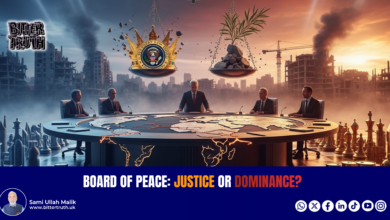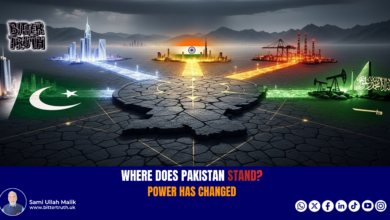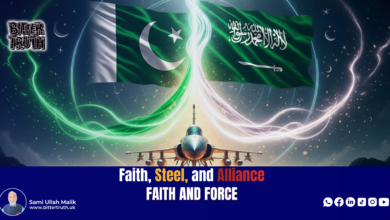Iqbal: The Concept of Nationalism and Patriotism
Iqbal's Critique of Nationalism and Patriotism in Modern Western Thought
Love for one’s country is a fundamental aspect of faith. The connection between a person and their place of birth or residence is a natural phenomenon. The affectionate sentiments expressed by the Prophet Muhammad (PBUH) towards Makkah serve as evidence of this patriotism. He said, “O Makkah! You are so dear, and I love you so much. If my people had not expelled me, I would have never lived anywhere else.” Genuine love for anything requires prioritizing it practically. When love for a place or object is passionate, it influences one’s priorities.
اس دور میں مے اور ہے، جام اور ہے اور جم اور
ساقی نے بِنا کی رَوشِ لطف و ستم اَور
مسلم نے بھی تعمیر کیا اپنا حرم اور
تہذیب کے آزر نے ترشوائے صنم اور
ان تازہ خداؤں میں بڑا سب سے وطن ہے
جو پیرہن اس کا ہے، وہ مذہب کا کفن ہے
As Allama Iqbal states:
“In this age, wine is different, the cup is different, and the goblet is different.
The style of grace and tyranny by the cupbearer is different.
Even the Muslim has built a different sanctuary,
The idols carved by the civilization’s artist are different.
Among these new gods, the greatest is the nation,
The garment it wears is the shroud of religion.”
Modern nationalism is often wielded as a tool by Western powers, aiming to achieve through it what they could not during the Crusades. The colonial powers have largely succeeded in dividing the Muslim Ummah. History is witness to many nations that were once powerful and feared, yet they were eventually wiped out due to their abandonment of faith and preference for racial and geographical identities. Nationalism, whether based on race or territorial boundaries, isolates individuals and fuels selfish desires. To highlight the importance of the Muslim collective identity, Iqbal says:
فرد قائم ربطِ مِلت سے ہے، تنہا کچھ نہیں
موج ہے دریا میں اور بیرونِ دریا کچھ نہیں
اپنی اصلیت سے ہو آگاہ اے غافل کہ تُو
قطرہ ہے لیکن مثالِ بحر بے پایاں بھی ہے
یقین افراد کا سرمایۂ تعمیرِ ملت ہے
یہی قوت ہے جو صورت گرِ تقدیر ملت ہے
The individual is connected to the nation, nothing alone
There is a wave in the river and nothing outside the river
Be aware of your true nature, O ignorant one
There is a drop, but the example of the ocean is also endless
Belief is the capital of individuals to build the nation
This is the power that creates the destiny of the nation
Nationalism began in the West after the French Revolution in 1789. The prominent nationalist, Jean-Jacques Rousseau, insisted that an individual’s primary loyalty should be to their home and country. He believed that a person’s love and loyalty should centre around their nation, opposing any broader collective, religious, or social systems. Western writers have often emphasized that nationalism, language, country, and race are the foundations of unity. They argue that defending the nation against others is essential, regardless of whether it is right or wrong. Consequently, nationalism has become a means of manipulating public emotions, mobilizing armies, attacking neighboring countries, expanding territories, and perpetuating violence, corruption, and oppression.
Islam, however, presents a distinct system of thought, encompassing the practical, political, social, and spiritual aspects of life. This is why nationalism inevitably conflicts with the Islamic concept of Ummah. The two ideologies are fundamentally opposed. The unity of the Islamic Ummah is based on an international concept, rooted in faith, which is why Iqbal considers religion as the backbone. He writes: “A nation is born from religion; without religion, you are nothing, Without mutual attraction, the assembly of stars is nothing. Harmony among individuals remains through religion, Religion is the string, and the unity of the community is the instrument. If one does not receive the water of the Ummah’s Zamzam, The new generation develops tendencies toward atheism.”
When different nations unite at a specific place or centre with their natural and appropriate combination and order, a collective entity emerges. For this reason, the Quran frequently refers to collectively as the foundation of national life and a great blessing from Allah for humanity.
Allah says:
وَاعْتَصِمُوا بِحَبْلِ اللَّهِ جَمِيعًا وَلَا تَفَرَّقُوا وَاذْكُرُوا نِعْمَتَ اللَّهِ عَلَيْكُمْ إِذْ كُنتُمْ أَعْدَاءً فَأَلَّفَ بَيْنَ قُلُوبِكُمْ فَأَصْبَحْتُم بِنِعْمَتِهِ إِخْوَانًا
And hold firmly to the rope of Allah all together and do not become divided. And remember the favour of Allah upon you – when you were enemies and He brought your hearts together and you became, by His favour, brothers. (A’al-E-Imran: 103)
In modern times, under the influence of nationalism (or patriotism), the bond of brotherhood has been severely damaged, leading to the division of humanity into tribes. When Iqbal saw this concept taking root among Muslims, he strongly criticized nationalism:
گفتارِ سیاست میں وطن اور ہی کچھ ہے
ارشادِ نبوت میں وطن اور ہی کچھ ہے
اقوامِ جہاں میں ہے رقابت تو اسی سے
تسخیر ہے مقصودِ تجارت تو اسی سے
اقوام میں مخلوقِ خدا بٹتی ہے اس سے
قومیتِ اسلام کی جڑ کٹتی ہے اس سے
خالی ہے صداقت سے سیاست تو اسی سے
کمزور کا گھر ہوتا ہے غارت تو اسی سے
یہ بت کہ تراشیدۂ تہذیبِ نوی ہے
غارت گرِ کاشانۂ دینِ نبویؐ ہے
In the discourse of politics, homeland is something else
There is something else about the homeland in the prophecy
Nations where there is rivalry is with him
Conquering is the purpose of trade
God’s creation is divided into nations by it
Nationality of Islam is rooted in it
Politics is devoid of truth because of this,
The home of the weak is plundered because of this
This idol is a carving of civilization
He is a plunderer of the house of the Prophet’s religion
In contemporary Western ideas, patriotism and nationalism are almost synonymous. Iqbal rejected the political concept of patriotism for the same reasons that formed his aversion to Western nationalism. He believed that nationalism as a political system inherently lacks human values, leading one group of people to become isolated from another. This separation often results in unnecessary conflicts, sometimes leading to the loss of valuable lives and widespread destruction. Iqbal viewed this system as a particularly deadly Western weapon against the Islamic world. When Arab nations supported the British against the Turks, he became convinced that the Western concepts of nationalism and patriotism were more detrimental to Muslims than poison. Consequently, he proposed the concept of the Islamic Ummah as an alternative to Western nationalism, arguing that, based on fundamental beliefs and principles, the idea of a broader Ummah was the only correct one for Muslims globally. He demonstrated that within the Western concept of nationalism, there are numerous hidden dangers that could lead to the downfall of Muslims as a united Ummah.
Iqbal used the terms “nation” and “Ummah” interchangeably, and by “Muslim nation,” he always meant the Islamic Ummah. He elaborates on this in his writings, stating, “I have used the term ‘Ummah’ in the sense of ‘nation.’ There is no doubt that in Arabic, especially in the Holy Qur’an, this term is used to refer to law and religion. However, in contemporary Arabic, Persian, and Turkish, there are numerous instances where ‘Ummah’ is used in the sense of ‘nation.’ In my writings, I have used ‘Ummah’ to mean ‘nation.'” Deliberate adherence to these concepts is akin to descending into darkness. Iqbal further writes, “My intention with these explanations is to show that, as far as I can see, the Qur’an has not used any term other than ‘Ummah’ for Muslims. A ‘nation’ is a group of men, which can exist in a thousand places and a thousand forms, based on tribe, race, colour, language, homeland, and customs. But ‘Ummah’ carves all these groups into a new, unified entity. In other words, ‘Ummah’ or ‘nation’ absorbs other nations; it does not dissolve into them.”
Iqbal was against the concept of nationalism based on race, colour, language, or homeland, as these distinctions hinder the formation of a broad human brotherhood. The elements that constitute his idea of nationalism include religious unity, cultural and historical unity, and a hopeful future. For Iqbal, Islam is the foundation of this Ummah, and the most significant and fundamental principle of Islam, Tawhid (the Oneness of God), ensures the unity of the Ummah. The second pillar is Prophethood, and these two are the essential foundations of the Ummah, not homeland, which incites the desire for war and conquest. Iqbal expresses this idea in one of his essays, stating, “In ancient times, ‘religion’ was national, as with the Egyptians, Greeks, and Hindus. Later, it became racial, as with the Jews. Christianity taught that religion is individual and private, with the state being responsible for the collective life of humans. It was Islam that first conveyed to humanity that ‘religion’ is neither national nor racial, neither individual nor private, but purely human. Its purpose is to unite and organize humanity despite natural distinctions.”
These statements show that Iqbal advocated for brotherhood based on Islam because he believed Islam is a way of life that offers solutions to vast human problems. He included nationalism within the framework of Islam because, in his view, a true human society could only be established by adhering to Islamic principles. Islam brought about a great revolution in human history, pulling mankind out of the narrow, artificial distinctions of race, lineage, and nation, and forming them into a broader social entity. According to Iqbal, the creation of this “social entity” was the ultimate goal of Islam. Unfortunately, this unity did not last, and Muslims became divided into various sects, groups, and factions. Iqbal urged Muslims to return to this Islamic brotherhood and taught the importance of being lost in the Ummah. He envisioned the establishment of a universal Ummah with one God, one Prophet, one Book, one Kaaba, one religion, and one faith:
منفعت ایک ہے اسی قوم کی نقصان بھی ایک
ایک ہی سب کا نبی دین بھی ایمان بھی ایک
حرم پاک بھی، اللہ بھی قرآن بھی ایک
کچھ بڑی بات تھی ہوتے جو مسلمان بھی ایک
“The benefit of this nation is one, and so is the loss,
One is the Prophet, one is the religion, and one is the faith,
The Holy Kaaba, Allah, and the Qur’an are all one,
It would have been a great thing if the Muslims were one too.
Iqbal viewed the Western concept of nationalism as highly destructive to the unity of the Islamic Ummah. By “caravan,” he referred to the past greatness of Muslims, asserting that distinctions based on race, colour, homeland, caste, and community hinder Islamic unity. He preached the idea of a global Ummah, whose unity is based on shared religion and civilization. The nationalism Iqbal advocated for was within the framework of Islam, and its foundation was based on religious beliefs. Thus, he stated:
قوم مذہب سے ہے، مذہب جو نہیں، تم بھی نہیں
جذبِ باہم جو نہیں، محفلِ انجم بھی نہیں
A nation is formed by religion; without religion, you do not exist,
Without mutual attraction, even the assembly of stars does not exist.
In today’s modern Western political thought, patriotism and nationalism are nearly synonymous. Iqbal rejected the political concept of patriotism for the same reasons that formed his aversion to Western nationalism. He believed that nationalism as a political system inherently lacks human values, leading one group of people to become isolated from another. This separation often results in unnecessary conflicts, sometimes leading to the loss of valuable lives and widespread destruction. Iqbal viewed this system as a particularly deadly Western weapon against the Islamic world. When Arab nations supported the British against the Turks, he became convinced that the Western concepts of nationalism and patriotism were more detrimental to Muslims than poison. Consequently, he proposed the concept of the Islamic Ummah as an alternative to Western nationalism, arguing that, based on fundamental beliefs and principles, the idea of a broader Ummah was the only correct one for Muslims globally. He demonstrated that within the Western concept of nationalism, there are numerous hidden dangers that could lead to the downfall of Muslims as a united Ummah. Deliberate adherence to these concepts is akin to descending into darkness.
Iqbal’s reference to “caravan” symbolizes the Islamic Ummah, which transcends all geographical concepts. The wealth of this caravan is essentially Islamic civilization, a God-cantered civilization that inherently values humanity. While the world may accept Islam as a religion, it struggles to embrace it as a comprehensive way of life. Iqbal’s philosophy of selfhood (Khudi) and Islam’s concept of self-purification serve as guiding lights for us. After his journey to Europe, Iqbal’s poetry awakened the nation, urging Muslims to break the idols of race and blood and unite as a single Ummah. This unity is the only way for Muslims to maintain their existence as a living nation. The artificial divisions of country, nation, race, and homeland have scattered humanity, and the only remedy is to promote the concept of an Islamic society, at least among Muslims themselves. This is the natural objective, the secret of Islamic brotherhood’s world-conquering power, and the abundance of love.
Iqbal’s concept of the Ummah is not merely a revolutionary slogan or an emotional decision but a deeply rooted part of his philosophy, with enduring significance in his work. Nor is Iqbal the creator of this concept; it arose during a time when the state of the Islamic world was akin to that of a sick body. After World War I, Muslim states were not truly independent or sovereign. Turkey was in disarray, with its territories resembling a broken deck of cards. Iran’s northern parts were under Russian control, while the southern parts were ruled by Britain. Africa and Egypt were colonized by European powers. Afghanistan’s rulers were nominally called emirs but were little more than pensioners, much like the nawabs of Oudh. Indonesia, under Dutch rule, was more focused on trade than political awakening. In India, Muslims lived as a minority. In this context, Iqbal’s concept of the Ummah was not just a revolutionary call but a continuation of a long cultural history.
Iqbal, once a proponent of patriotism, witnessed the injustices perpetrated by nations in the guise of nationalism. From his study of Iqbal’s sociopolitical thoughts, we conclude that Iqbal disliked Western democracy because of its secular and unrestricted nature, but he accepted the democratic spirit, which includes freedom of thought and expression. He wanted Muslims to avoid secular republics and the moral decay associated with liberalism. Instead, Muslims should harness the democratic spirit to reform their system of caliphate through ijtihad (independent reasoning) into a representative system where the collective is more powerful than the individual. An Islamic state should establish a legislative body that draws on the rich tradition of Islamic jurisprudence to create a modern legal system that meets contemporary needs. This system should aim for the spiritual emancipation of individuals, and the universal application of this principle should lead to the spiritual evolution of human society. This fundamental principle of spiritual emancipation and societal evolution in Iqbal’s thought is derived from a spiritual interpretation of the universe. He adopted this perspective after modern physics revealed that matter is transformable and perishable, thereby affirming the Quranic concept of Tawhid (the oneness of God) as the basis for a new metaphysics.
Iqbal opposes the concept of nationalism based on race, language, or homeland because these boundaries hinder the formation of a broad human brotherhood. His notion of nationhood is composed of the unity of religion, civilization, and a shared history with hope for the future. As far as religion is concerned, Islam forms the foundation of this Ummah. The greatest and most fundamental principle of Islam is the oneness of God, which ensures the unity of the Ummah. The second pillar is the Prophethood, and these two are the essential foundations of the Ummah, not the homeland, which fosters the desire for war and territorial conquest. Therefore, Iqbal’s concept of nationhood is rooted in Islamic beliefs. He says:
قوم مذہب سے ہے مذہب جو نہیں تم بھی نہیں
جذب باہم جو نہیں، محفل ِ انجم بھی نہیں
تو نہ مٹ جائے گا ایران کے مٹ جانے سے
نشہ مے کو تعلق نہیں پیمانے سے
اپنی ملت پر قیاس اقوامِ مغرب سے نہ کر
خاص ہے ترکیب میں قوم ِ رسولِ ہاشمی
دامن دیں ہاتھ سے چھوٹا تو جمعیت کہاں
اور جمعیت ہوئی رخصت تو ملت بھی گئی
The nation is defined by religion; without religion, you are nothing.
Without mutual attraction, even the assembly of stars is nothing.
You will not cease to exist with the fall of Iran.
The intoxication of wine is not dependent on the cup.
Do not compare your nation with the Western nations.
The nation of the Prophet (PBUH) is unique in its composition.
When the robe of religion slips from your hands,
where is the unity? And when unity departs, the Ummah also disintegrates.
The challenges we face today can only be overcome by adopting Iqbal’s concept of nationhood as our faith and conviction as a Muslim Ummah. Then, we will neither fear superpowers like the United States nor face economic crises; instead, the Muslim Ummah will rise as a superpower itself.






